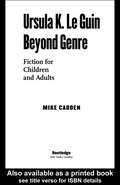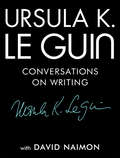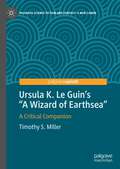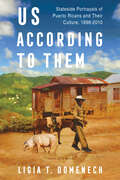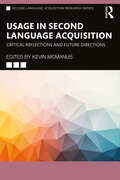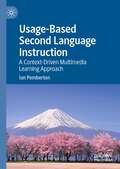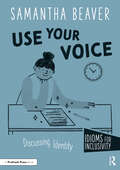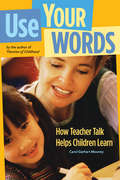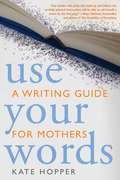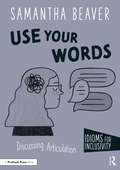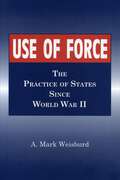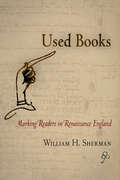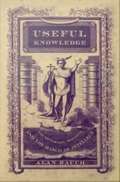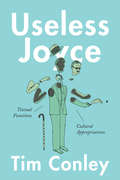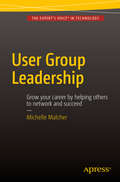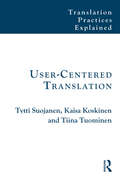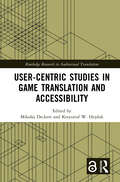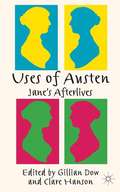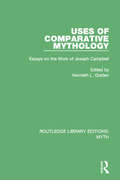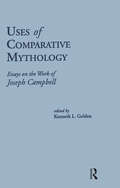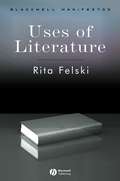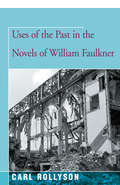- Table View
- List View
Ursula K. Le Guin Beyond Genre: Fiction for Children and Adults (Children's Literature and Culture)
by Mike CaddenThis book critically examines Le Guin's fiction for all ages, and it will be of great interest to her many admirers and to all students and scholars of children's literature.
Ursula K. Le Guin's The Left Hand of Darkness (Modern Critical Interpretations)
by Harold BloomEssays by David Ketterer, Fredric Jameson, Donald F. Theall, Martin Bickman, Jeanne Murray Walker, Eric S. Rabkin, Barbara Brown, Victoria Myers, and Carol McGuirk.
Ursula K. Le Guin: Conversations On Writing (Library Of America Ursula K. Le Guin Edition Ser. #297)
by Ursula K. Le Guin David NaimonUrsula K. Le Guin discusses her fiction, nonfiction, and poetry?both her process and her philosophy?with all the wisdom, profundity, and rigor we expect from one of the great writers of the last century. When the New York Times referred to Ursula K. Le Guin as America’s greatest writer of science fiction, they just might have undersold her legacy. It’s hard to look at her vast body of work?novels and stories across multiple genres, poems, translations, essays, speeches, and criticism?and see anything but one of our greatest writers, period. In a series of interviews with David Naimon (Between the Covers), Le Guin discusses craft, aesthetics, and philosophy in her fiction, poetry, and nonfiction respectively. The discussions provide ample advice and guidance for writers of every level, but also give Le Guin a chance to to sound off on some of her favorite subjects: the genre wars, the patriarchy, the natural world, and what, in her opinion, makes for great writing. With excerpts from her own books and those that she looked to for inspiration, this volume is a treat for Le Guin’s longtime readers, a perfect introduction for those first approaching her writing, and a tribute to her incredible life and work.
Ursula K. Le Guin’s "A Wizard of Earthsea": A Critical Companion (Palgrave Science Fiction and Fantasy: A New Canon)
by Timothy S. MillerWritten not so long after "Tolkien mania" first gripped the United States in the 1960s, Ursula K. Le Guin's novel A Wizard of Earthsea (1968) has long been recognized as a classic of the fantasy genre, and the series of Earthsea books that followed on it over the next several decades earned its author both considerable sales and critical accolades. This new introduction to the text will closely contextualize the original novel in relation to its heady decade of composition and publication — a momentous time for genre publishing — and also survey the half century and more of scholarship on Earthsea, which has shifted in direction and emphasis many times over the decades, just as surely as Le Guin frequently adjusted her own sails when composing later works set in the fantasy world. Above all, this book positions A Wizard of Earthsea as perhaps an "old text" that nevertheless belongs in a "new canon," a key novel in the author's career and the genre in which it participates, and one that at once looks back to Tolkien and his own antecedents in masculinist early fantasy; looks forward to Le Guin's own continuing feminist and progressive education; and anticipates and indeed helped to shape young adult literature in its contemporary form.
Us According to Them: Stateside Portrayals of Puerto Ricans and Their Culture, 1898-2010
by Ligia T. DomenechThe acquisition of Puerto Rico as a colony in 1898 prompted the interest of many in the United States—the military, correspondents, investors, missionaries, politicians, scientists, and tourists. Wanting to know more about Puerto Rico, its inhabitants, and its potential utility, many of these curious but untrained observers visited the island and documented their experiences for the benefit of future visitors. Decades later, readers continue to revisit these writings and create new accounts that explore the “effects of American civilization” on Puerto Rican society.In Us According to Them: Stateside Portrayals of Puerto Ricans and Their Culture, 1898-2010, Puerto Rican historian Ligia T. Domenech exposes the distorted mirror turned on Puerto Rico, one constructed through the eyes of foreigners. Each of the eighteen chapters focuses on a different aspect of mainland US descriptions of Puerto Rican culture—from gender, race, and class to music, religion, and food. Accurate or not, books on Puerto Rico have contained perceptions about Puerto Ricans and their world that continue to shape opinions held by US citizens dwelling stateside. This book explores the lasting impacts of these repeated stereotypes on the collective understandings of both the colonizer and the colonized.
Usage in Second Language Acquisition: Critical Reflections and Future Directions (Second Language Acquisition Research Series)
by Kevin McManusThe study of “usage” has constituted a major line of second language learning research for decades now. The concept of usage, however, can be defined and studied in many different ways. In this comprehensive, forward-looking text, international scholars from a variety of perspectives review and critically examine current conceptualizations of usage, learning, and their connections in the field of second language acquisition (SLA). Bringing these diverse perspectives into conversation, Kevin McManus synthesizes the state of the art to set the agenda for new directions in theory-building and empirical SLA research. This text will be an invaluable resource to students and researchers in SLA, applied linguistics, psychology and cognitive science, education, and related areas.
Usage-Based Second Language Instruction: A Context-Driven Multimedia Learning Approach
by Ian PembertonThis book proposes an innovative pedagogical approach, Usage-Based Second Language Instruction, which continues the tradition of challenges to existing paradigms such as Steven Krashen's Natural Approach, and Michael Lewis' Lexical Approach. It begins by analysing historical teaching methods to make the case for change. The author argues that Communicative Language Teaching lacks a theory of learning and overemphasises spoken production as a result. The book then examines theories of first language acquisition to establish a theoretical basis for change. It finds that usage-based theories offer a highly plausible account of language learning. The author sets out six principles to guide the application of usage-based theory to second language learning. The book will be of particular interest to students and researchers of Applied Linguistics and Language Education.
Use Your Voice: Discussing Identity (Idioms for Inclusivity)
by Samantha BeaverTo get the complete Idioms for Inclusivity experience, this book can be purchased alongside four others as a set, Idioms for Inclusivity: Fostering Belonging with Language, 978-1-032-28635-8. Informed by sociolinguistic research, yet written accessibly, Use Your Voice challenges readers to investigate the concept of identity as it relates to both language-use and inclusivity. This engaging and delightfully illustrated book invites students to engage with concepts such as: the cultural meaning of the idiom "use your voice" Indexicality, a framework that linguists use to research and understand how our identities are encoded in language, Why the expectation to "use your voice" can make someone feel excluded, and how understanding the way language works can help us learn to be more inclusive Featuring practical inclusivity tips related to integrating learning into daily conversations, this enriching curriculum supplement can be used in a Language Arts setting to learn about figurative language; in a Social Studies setting to discuss diversity, equity, inclusion, and belonging; or as an introduction to linguistics for students ages 7-14.
Use Your Words
by Carol Garhart MooneyUse Your Words examines the ways early childhood teachers talk to children, pointing out commonly missed opportunities to support cognitive development, develop receptive and expressive language, and aid children in their primary developmental task of making sense of the world. From the author of Theories of Childhood, this humorous and thoughtful guide contains a wealth of classroom examples, as well as clear alternatives for transforming the language teachers use in the classroom.
Use Your Words
by Hope Edelman Kate HopperUSE YOUR WORDS introduces the art of creative nonfiction to women who want to give written expression to their lives as mothers. Written by award-winning teacher and writer, Kate Hopper, this book will help women find the heart of their writing, learn to use motherhood as a lens through which to write the world, and turn their motherhood stories into art. Each chapter of USE YOUR WORDS focuses on an element of craft and contains a lecture, a published essay, and writing exercises that will serve as jumping-off points for the readers' own writing. Chapter topics include: the importance of using concrete details, an overview of creative nonfiction as a genre, character development, voice, humor, tense and writing the "hard stuff," reflection and back-story, structure, revision, and publishing. The content of each lecture is aligned with the essay/poem in that chapter to help readers more easily grasp the elements of craft being discussed. Together the chapters provide a unique opportunity for mother writers to learn and grow as writers.USE YOUR WORDS takes the approach that creative writing can be taught, and this underscores each chapter. When students learn to read like writers, to notice how a piece is put together, and to question the choices a writer makes, they begin to think like writers. When they learn to ground their writing in concrete, sensory details and begin to understand how to create believable characters and realistic dialogue, their own writing improves. USE YOUR WORDS reflects Kate's style as a teacher, guiding the reader in a straightforward, nurturing, and passionate voice. As one student noted in a class evaluation: "Kate is a born writer and teacher, and her enthusiasm for essays about motherhood and for teaching the nuts and bolts of writing so that ordinary mothers have the tools to write their stories is a gift to the world. She is raising the value of motherhood in our society as she helps mothers build their confidence and strengthen their game as writers."
Use Your Words: A Writing Guide for Mothers
by Kate HopperUSE YOUR WORDS introduces the art of creative nonfiction to women who want to give written expression to their lives as mothers. Written by award-winning teacher and writer, Kate Hopper, this book will help women find the heart of their writing, learn to use motherhood as a lens through which to write the world, and turn their motherhood stories into art. Each chapter of USE YOUR WORDS focuses on an element of craft and contains a lecture, a published essay, and writing exercises that will serve as jumping-off points for the readers' own writing. Chapter topics include: the importance of using concrete details, an overview of creative nonfiction as a genre, character development, voice, humor, tense and writing the "hard stuff," reflection and back-story, structure, revision, and publishing. The content of each lecture is aligned with the essay/poem in that chapter to help readers more easily grasp the elements of craft being discussed. Together the chapters provide a unique opportunity for mother writers to learn and grow as writers. USE YOUR WORDS takes the approach that creative writing can be taught, and this underscores each chapter. When students learn to read like writers, to notice how a piece is put together, and to question the choices a writer makes, they begin to think like writers. When they learn to ground their writing in concrete, sensory details and begin to understand how to create believable characters and realistic dialogue, their own writing improves. USE YOUR WORDS reflects Kate's style as a teacher, guiding the reader in a straightforward, nurturing, and passionate voice. As one student noted in a class evaluation: "Kate is a born writer and teacher, and her enthusiasm for essays about motherhood and for teaching the nuts and bolts of writing so that ordinary mothers have the tools to write their stories is a gift to the world. She is raising the value of motherhood in our society as she helps mothers build their confidence and strengthen their game as writers."
Use Your Words: Discussing Articulation (Idioms for Inclusivity)
by Samantha BeaverTo get the complete Idioms for Inclusivity experience, this book can be purchased alongside four others as a set, Idioms for Inclusivity: Fostering Belonging with Language, 978-1-032-28635-8. Informed by sociolinguistic research, yet written accessibly, Use Your Words challenges readers to investigate the concept of articulation as it relates to both language-use and inclusivity. This engaging and delightfully illustrated book invites students to engage with concepts such as: the cultural meaning of the idiom "use your words", Linguistic Relativity, a framework linguists use to research and understand how thought and language influence one another, why being told to "use your words" can make someone feel excluded, and how understanding the way language works can help us learn to be more inclusive Featuring practical inclusivity tips related to integrating learning into daily conversations, this enriching curriculum supplement can be used in a Language Arts setting to learn about figurative language; in a Social Studies setting to discuss diversity, equity, inclusion, and belonging; or as an introduction to linguistics for students ages 7-14.
Use of Force: The Practice of States Since World War II
by Arthur Mark WeisburdThis book is among the few to develop in detail the proposition that international law on the subject of interstate force is better derived from practice than from treaties. Mark Weisburd assembles here a broad body of evidence to support practice-based rules of law on the subject of force. Analyses of a particular use of force by a state against another state generally begin with the language of the Charter of the United Nations. This approach is seriously flawed, argues Weisburd. States do not, in fact, behave as the Charter requires. If the legal rule regulating the use of force is the rule of the Charter, then law is nearly irrelevant to the interstate use of force. However, treaties like the Charter are not the only source of public international law. Customary law, too, is binding on states. If state behavior can be shown to conform generally to what amount to tacit rules on the use of force, and if states generally enforce such rules against other states, then the resulting pattern of practice strongly supports the argument that the use of force is affected by law at a very practical level. This work aims to demonstrate that such patterns exist and to explain their content. Weisburd discusses over one hundred interstate conflicts that took place from 1945 through 1991. He focuses on the behavior of the states using force and on the reaction of third parties to the use of force. He concentrates upon state practice rather than upon treaty law and does not assume a priori that any particular policy goal can be attributed to the international legal system, proceeding instead on the assumption that the system's goals can be determined only by examining the workings of the system.
Used Books
by William H. ShermanIn a recent sale catalog, one bookseller apologized for the condition of a sixteenth-century volume as "rather soiled by use." When the book was displayed the next year, the exhibition catalogue described it as "well and piously used [with] marginal notations in an Elizabethan hand [that] bring to life an early and earnest owner"; and the book's buyer, for his part, considered it to be "enlivened by the marginal notes and comments." For this collector, as for an increasing number of cultural historians and historians of the book, a marked-up copy was more interesting than one in pristine condition.William H. Sherman recovers a culture that took the phrase "mark my words" quite literally. Books from the first two centuries of printing are full of marginalia and other signs of engagement and use, such as customized bindings, traces of food and drink, penmanship exercises, and doodles. These marks offer a vast archive of information about the lives of books and their place in the lives of their readers.Based on a survey of thousands of early printed books, Used Books describes what readers wrote in and around their books and what we can learn from these marks by using the tools of archaeologists as well as historians and literary critics. The chapters address the place of book-marking in schools and churches, the use of the "manicule" (the ubiquitous hand-with-pointing-finger symbol), the role played by women in information management, the extraordinary commonplace book used for nearly sixty years by Renaissance England's greatest lawyer-statesman, and the attitudes toward annotated books among collectors and librarians from the Middle Ages to the present.This wide-ranging, learned, and often surprising book will make the marks of Renaissance readers more visible and legible to scholars, collectors, and bibliophiles.
Useful Knowledge: The Victorians, Morality, and The March of Intellect
by Alan RauchNineteenth-century England witnessed an unprecedented increase in the number of publications and institutions devoted to the creation and the dissemination of knowledge: encyclopedias, scientific periodicals, instruction manuals, scientific societies, children's literature, mechanics' institutes, museums of natural history, and lending libraries. In Useful Knowledge Alan Rauch presents a social, cultural, and literary history of this new knowledge industry and traces its relationships within nineteenth-century literature, ending with its eventual confrontation with Charles Darwin's Origin of Species. Rauch discusses both the influence and the ideology of knowledge in terms of how it affected nineteenth-century anxieties about moral responsibility and religious beliefs. Drawing on a wide array of literary, scientific, and popular works of the period, the book focusses on the growing importance of scientific knowledge and its impact on Victorian culture. From discussions of Jane Webb Loudon's The Mummy! and Mary Shelley's Frankenstein, to Charlotte Bront's The Professor, Charles Kingsley's Alton Locke, and George Eliot's Mill on the Floss, Rauch paints a fascinating picture of nineteenth-century culture and addresses issues related to the proliferation of knowledge and the moral issues of this time period. Useful Knowledge touches on social and cultural anxieties that offer both historical and contemporary insights on our ongoing preoccupation with knowledge. Useful Knowledge will appeal to readers interested in nineteenth century history, literature, culture, the mediation of knowledge, and the history of science.
Useless Joyce: Textual Functions, Cultural Appropriations
by Tim ConleyTim Conley’s Useless Joyce provocatively analyses Joyce’s Ulysses and Finnegans Wake and takes the reader on a journey exploring the perennial question of the usefulness of literature and art. Conley argues that the works of James Joyce, often thought difficult and far from practical, are in fact polymorphous meditations on this question. Examinations of traditional textual functions such as quoting, editing, translating, and annotating texts are set against the ways in which texts may be assigned unexpected but thoroughly practical purposes. Conley’s accessible and witty engagement with the material views the rise of explication and commentary on Joyce’s work as an industry not unlike the rise of self-help publishing. We can therefore read Ulysses and Finnegans Wake as various kinds of guides and uncover new or forgotten “uses” for them. Useless Joyce invites new discussions about the assumptions at work behind our definitions of literature, interpretation, and use.
User Group Leadership
by Michelle MalcherThis book is about starting and sustaining a technology user group. User groups are a wonderful way to connect with local and like-minded professionals for networking and learning. All the forums and social media on the internet can't replace face-to-face time spent discussing problems, upcoming technologies, and other pertinent topics. What every user group needs is leaders to organize meetings, find speakers, and connect the community. What every leader needs is good advice and guidance on how to begin a group and nurture new leadership to keep the group sustainable, and Michelle Malcher provides just that right sort of guidance in her book on User Group Leadership. This book is designed to help you understand what goes into starting and building a user group, giving you the tools and resources to do so. Learn what to expect before your first meeting, in the first three months, and in the first year. Malcher has experience from the local group level on up to the international level with the Independent Oracle User Group. If you're involved in technology and are ready to take on a position of leadership by which to help others network, succeed, and grow, then grab a copy of this book. You won't find a better source of guidance for starting and growing a new group on the technology of your choice. Learn what to know before you ever have your first meeting Prepare for each meeting with a list of things that should be done Grow your local members into future leaders What you'll learn Choose the right motivations for starting a group Build a governance structure and integrate with an umbrella group Locate and book interesting speakers Recruit help to share the administrative burden Grow the next generation of leadership Make a difference in people's careers by helping them grow and network and learn Who this book is for User Group Leadership is aimed at technology professionals interested in networking and learning with like-minded people in their same technology area. The book is especially aimed at the ambitious professional who is ready to step into a leadership role by creating a vibrant user community where no such community currently exists, but one is needed. Table of Contents 1. Development of a User Group 2. User Group Governance 3. Building Leaders and Volunteers 4. User Group Planning 5. User Group Members 6. Challenges 7. Career Development 8. From Techie to Leader 9. Qualities of a User Group Leader 10. Qualities of a User Group Volunteer
User-Centered Translation (Translation Practices Explained)
by Tytti Suojanen Kaisa Koskinen Tiina TuominenTranslators want to take their readers into account, but traditional translation theory does not offer much advice on how to do that. User-Centered Translation (UCT) offers practical tools and methods to help empower translators to act for their readers. This book will help readers to: Create mental models such as personas; Test translations with usability testing methods; Carry out reception research. Including assignments, case studies and real-life scenarios ranging from the translation of user instructions and EU texts to literary and audiovisual translation, this is an essential guide for students, translators and researchers.
User-Centric Studies in Game Translation and Accessibility (Routledge Research in Audiovisual Translation)
by Mikołaj Deckert Krzysztof W. HejdukThis innovative collection makes the case for a push within the discipline to adopt user-centric perspectives on translated video games and their corresponding accessibility features.The volume demonstrates how audiovisual translation (AVT) and media accessibility (MA) involve decisions that can re-shape the gaming experience of players and other audiences. Contributions in the book outline this in two ways. First, they collectively provide an account of the prospects and challenges that come with user-centric scholarly inquiry in game translation and accessibility. Second, complementarily, they report on original studies and new, exciting findings while adopting the perspective of global users. Taken together, the collection serves as a call to action to systematically advance research eliciting variable types of input from users who take advantage of translation and accessibility services. Such research will facilitate a clearer understanding of how the particular decisions of translators and other relevant agents shape game reception.This book will be of interest to scholars in both translation studies and video game research, as well as those interested in media accessibility and media studies more broadly.Chapters 7 of this book is freely available as a downloadable Open Access PDF at http://www.taylorfrancis.com under a Creative Commons Attribution-NonCommercial-NoDerivs (CC BY-NC-ND) license.
Uses of Austen
by Gillian Dow Clare HansonThis book focuses on how Austen's life and work is being re-framed and re-imagined in 20th and 21st century literature and culture. Tracing the connections between Modernist Austen in the early C20th and feminist and post-feminist appropriations in the later C20th, it examines how Austen emerged as a complex point of reference on the global stage.
Uses of Comparative Mythology: Essays on the Work of Joseph Campbell (Routledge Library Editions: Myth #Vol. 1338)
by Kenneth L. GoldenThis collection, first published in 1992, offers critical-interpretive essays on various aspects of the work of Joseph Campbell (1904-1987), one of a very few international experts on myth. Joseph Campbell examines myths and mythologies from a comparative point of view, and he stresses those similarities among myths the world over as they suggest an existing, transcendent unity of all humankind. His interpretations foster an openness, even a generous appreciation of, all myths; and he attempts to generate a broad, sympathetic understanding of the role of these ‘stories’ in human history, in our present-day lives, and in the possibilities of our future.
Uses of Comparative Mythology: Essays on the Work of Joseph Campbell (Routledge Library Editions: Myth Ser. #3)
by Kenneth L. GoldenThis collection, first published in 1992, offers critical-interpretive essays on various aspects of the work of Joseph Campbell (1904-1987), one of a very few international experts on myth. Joseph Campbell examines myths and mythologies from a comparative point of view, and he stresses those similarities among myths the world over as they suggest an existing, transcendent unity of all humankind. His interpretations foster an openness, even a generous appreciation of, all myths; and he attempts to generate a broad, sympathetic understanding of the role of these 'stories' in human history, in our present-day lives, and in the possibilities of our future.
Uses of Literature
by Rita FelskiUses of Literature bridges the gap between literary theory and common-sense beliefs about why we read literature. Explores the diverse motives and mysteries of why we read. Offers four different ways of thinking about why we read literature - for recognition, enchantment, knowledge, and shock. Argues for a new "phenomenology" in literary studies that incorporates the historical and social dimensions of reading. Includes examples of literature from a wide range of national literary traditions
Uses of the Past in the Novels of William Faulkner
by Carl RollysonOriginally selected by Faulkner scholars Blotner and Litz for their series on the author, this pathbreaking monograph contains a comprehensive and provocative discussion of Faulkner's historical vision. Drawing on the rich literature of historiography (including the writings of R. G. Collingwood and Herbert Butterfield), and on a wide-ranging body of scholarship on the historical novel (including discussions of Scott, Thackeray, and Conrad), Rollyson shrewdly probes Faulkner's dynamic and changing uses of the past. Also taking advantage of his own work as a biographer, Rollyson has updated, revised, and expanded his original book--extending his dialogue with recent Faulkner critics.
